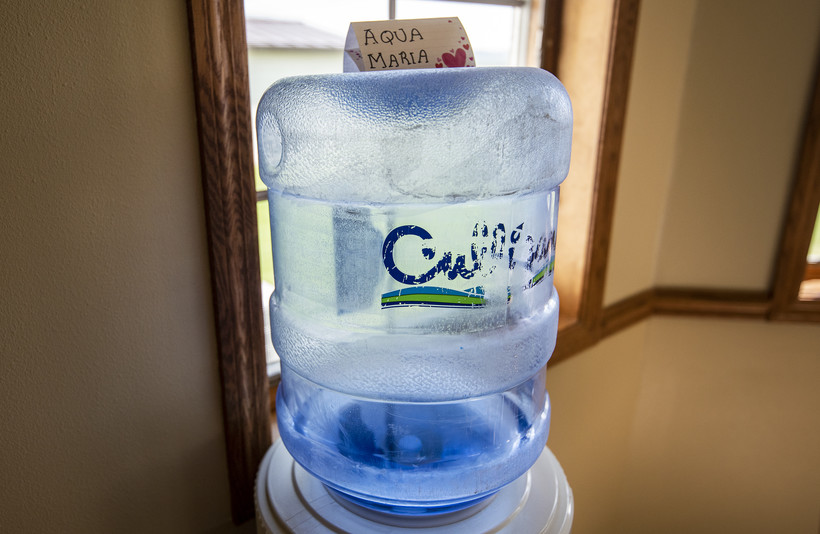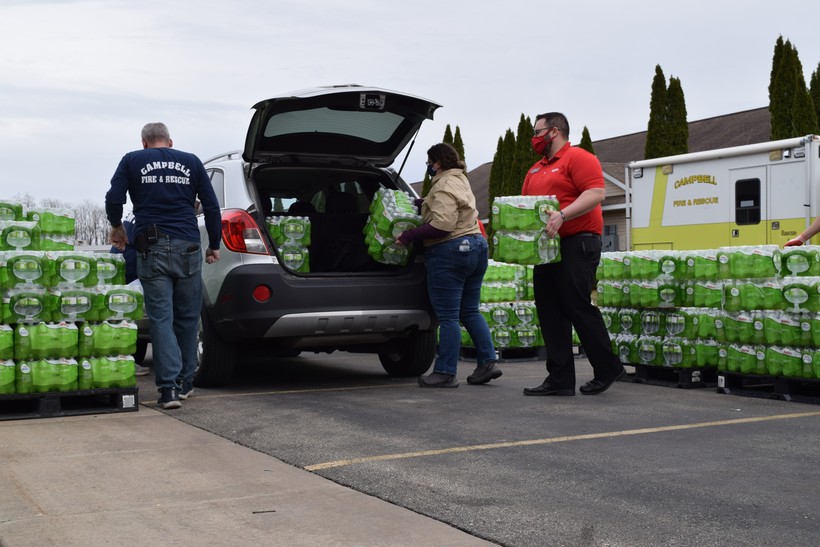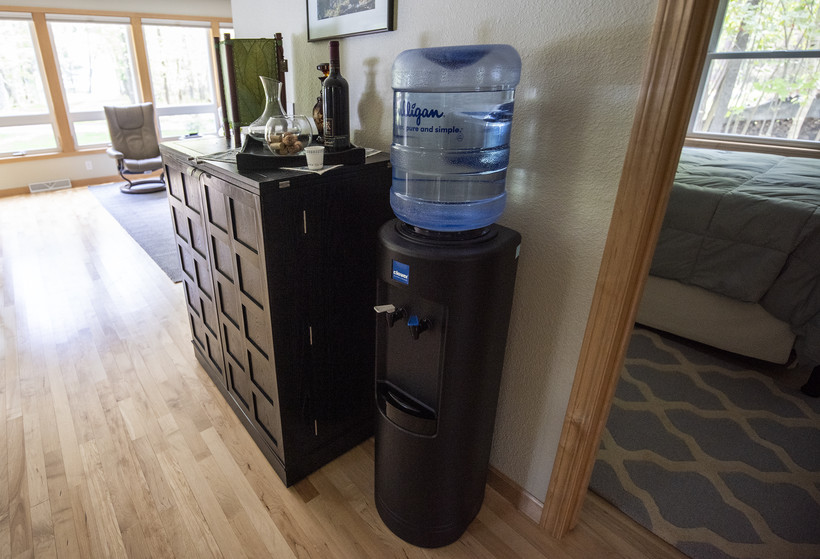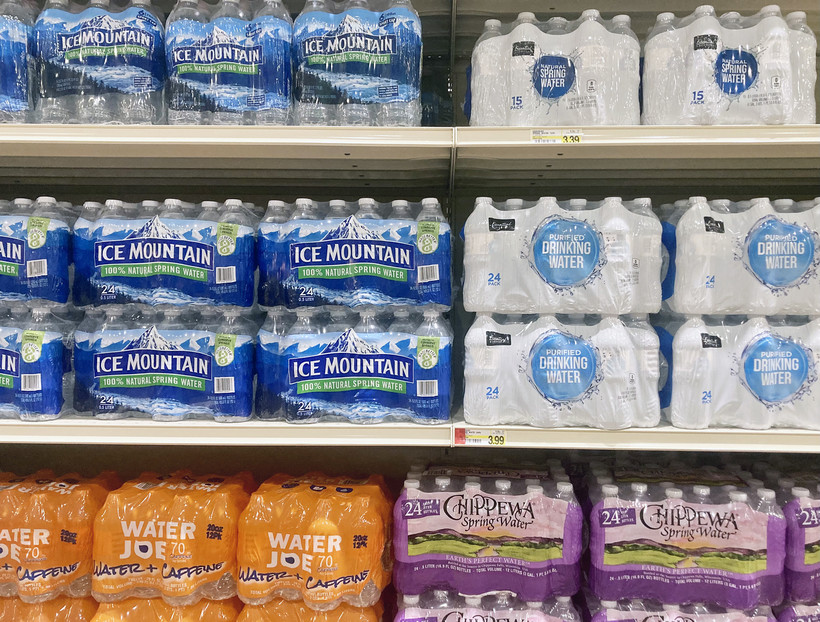DNR Says Bottled Water Companies Aren’t Required to Test For PFAS
Not required in Wisconsin by state or federal rules, but some companies do it voluntarily.

Mary Wetterling named the water dispenser at her French Island, Wis., home “Aqua Maria.” Angela Major/WPR
The state Department of Natural Resources said bottled water companies in Wisconsin aren’t required to test for PFAS under current state and federal regulations.
The state is currently paying about $550,000 to companies providing temporary bottled water to communities struggling with PFAS contamination of private wells. The DNR said it’s contracting with vendors that voluntarily sample for the chemicals.
“We currently do not have groundwater standards for PFAS,” Zellmer said. “So right now, DATCP does not require Wisconsin water bottlers to sample for PFAS.”
While not required, Zellmer said a number of companies voluntarily sample for the chemicals or use treatment methods capable of removing PFAS.

French Island residents pick up bottled water on March 25, 2021, over concerns of PFAS contamination in private drinking water wells. Hope Kirwan/WPR
The DNR’s policy-making board approved a drinking water standard of 70 parts per trillion for PFAS, which took effect in August of last year. However, the board failed to pass limits for PFAS in groundwater. While those standards are lacking, the DNR is crafting limits for the chemicals in groundwater. Around a third of state residents get their drinking water from private wells.
“These requirements are linked to federal requirements, and therefore change when federal requirements do so,” GO said in an email.
While bottled water must meet FDA standards, the agency has based them on national drinking water regulations set by the Environmental Protection Agency. However, the EPA has yet to release federal drinking water standards for PFAS. Earlier this year, federal regulators proposed limits of 4 parts per trillion for the two most widely studied PFAS chemicals. The EPA plans to finalize standards for six substances by the end of the year.
The DNR wanted to ensure the safety of alternative water sources after PFAS was found in bottled water that’s sold in Maine and other New England states. At the time, local media reported it didn’t violate state standards or federal health advisory levels. Earlier this year, lawmakers in Maine introduced legislation that would have required bottled water processors to test for the chemicals, but it failed to pass.
In Wisconsin, the DNR said it’s currently providing five communities with bottled water. Those communities include the towns of Campbell, Peshtigo, and Stella. A small number of private well owners are also receiving bottled water in the city of Manitowoc and town of Dunn.
Town of Campbell Supervisor Lee Donahue said it’s important the state set a groundwater standard for PFAS, so people can feel confident that the water they’re drinking is safe.
“So many people would tell me, ‘Oh, well, I drink bottled water.’ And I’m like, ‘But bottled water isn’t tested for PFAS,'” Donahue said. “And they were like ‘Well, it must be fine because they sell cases and cases and cases of it.'”
One 2021 study found PFAS in 39 out of 101 bottled water products that ranged in levels from almost zero to nearly 19 parts per trillion. David Strifling is director of the Water Law and Policy Initiative at Marquette University Law School. He said there’s no general assurance that bottled water is safer than tap water.
“The fact of the matter is the monitoring and inspection requirements are just not as robust as they are for tap water under the Safe Drinking Water Act,” Strifling said.

Jeff Lamont has a water dispenser in his Peshtigo, Wis., home due to PFAS contamination in the tap water. Angela Major/WPR
He said bottled water is tested less frequently than tap water. In Wisconsin, the largest public water systems collect hundreds of samples each month. Meanwhile, the state’s bottled water plants are required to test for bacteria each week. Pesticides, nitrates, and other contaminants are tested every year. Strifling added there’s no requirement to quickly inform people about unsafe levels of contaminants as exists with public water supplies.
State law does require DATCP to publish an annual report on bottled water that’s sampled. The agency’s most recent report from 2021 states all but one sample met public health standards. It also said they’re required to meet the same quality and safety standards as municipal water systems. However, the DNR said that refers to standards overseeing the taste and odor of drinking water.
The International Bottled Water Association, or IBWA, represents around 130 bottled water companies across the country, including Culligan. While not mandated, the trade group said it requires members to test for 18 PFAS chemicals in products they sell. Members must show their bottled water meets the association’s standards of 5 parts per trillion for one PFAS chemical and 10 parts per trillion for more than one PFAS chemical.
“We are not aware of any instance in which a member company has found levels of PFAS above the IBWA (standard of quality),” the group’s spokesperson Jill Culora said in a statement.
In November 2019, the trade group asked the FDA to set a standard for PFAS in bottled water. In a letter, the FDA said the agency felt “it would be premature” to set a standard while the EPA’s work to address PFAS in drinking water is ongoing.
The FDA confirmed Monday there’s currently no standard for PFAS testing in bottled water.
“Each time the EPA establishes a standard for a contaminant in water, the FDA either adopts it for bottled water or finds that the standard isn’t necessary for bottled water,” an FDA spokesperson said in a statement.
If people are seeking an alternative source of water, Zellmer urged people to first double-check the website of bottled water companies to see if they voluntarily sample for the chemicals.
Listen to the WPR report here.
DNR says bottled water companies aren’t required to test for PFAS in Wisconsin was originally published by Wisconsin Public Radio.
More about the PFAS Problem
- PFAS Levels in Great Lakes Fish Are Dropping - Danielle Kaeding - Feb 6th, 2026
- Gov. Evers and GOP Lawmakers Near a Deal on PFAS Pollution - Danielle Kaeding - Jan 22nd, 2026
- Gov. Evers Optimistic About Reaching Final Deal With Republican Lawmakers to Secure Release of $125 Million in Long-Awaited Pfas Investments - Gov. Tony Evers - Jan 21st, 2026
- Bipartisan Push to Tell Counties Faster When Water Tests Fail - Henry Redman - Dec 19th, 2025
- MKE County: County Seeks to Sue PFAS Producers, Oil Companies - Graham Kilmer - Dec 10th, 2025
- Wisconsin Reviewing EPA-Approved Pesticides For PFAS - Danielle Kaeding - Dec 9th, 2025
- State Nears Settlement with Johnson Controls/Tyco Over PFAS Spills - Danielle Kaeding - Dec 4th, 2025
- Senate Bill Promotes Soybean-Based Firefighting Foam to Replace PFAS - Danielle Kaeding - Dec 2nd, 2025
- Test Results Show High PFAS Levels in Wisconsin’s Landfill Runoff - Danielle Kaeding - Dec 2nd, 2025
- Wisconsin Communities Get $282 Million for Drinking Water Projects - Danielle Kaeding - Nov 19th, 2025
Read more about PFAS Problem here






















Not required to test for PFAS? Another Republican inside deal with water industry donors.